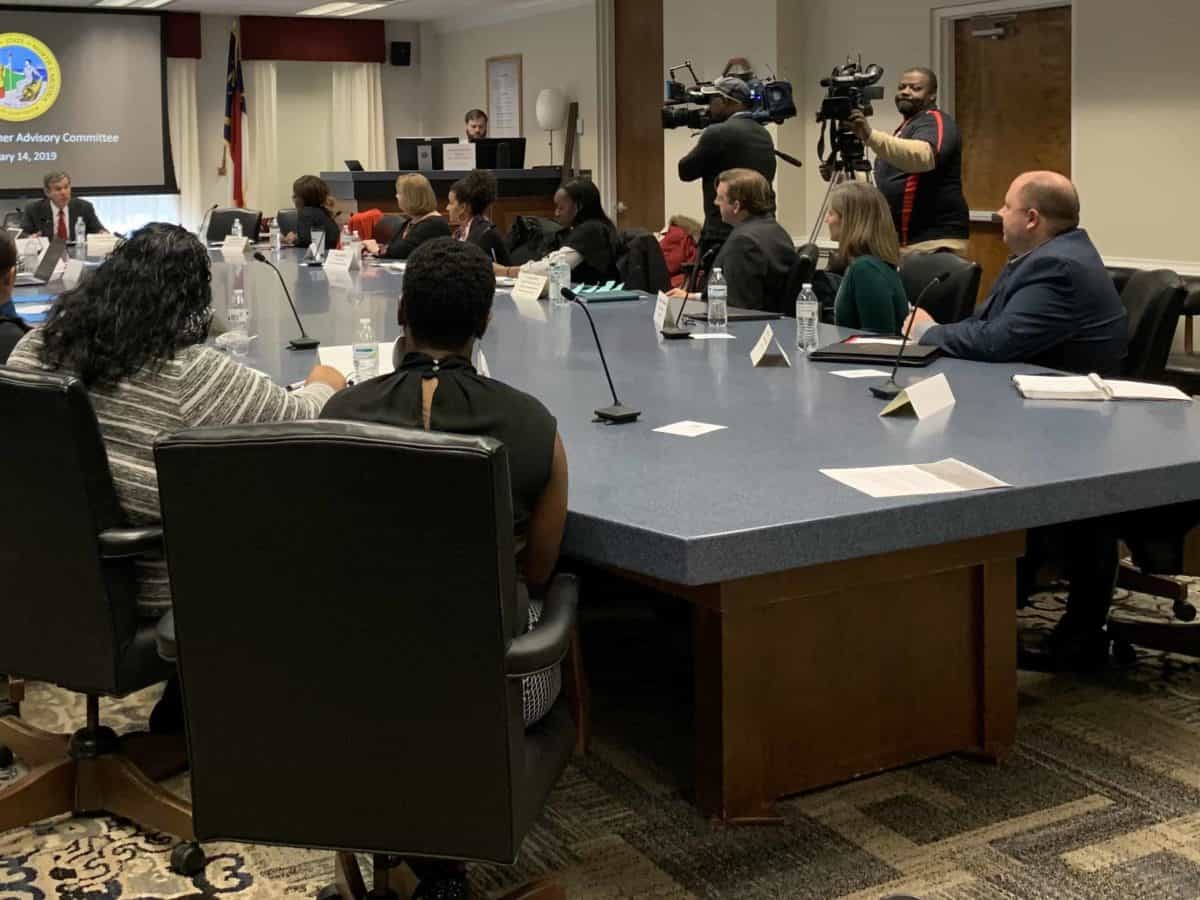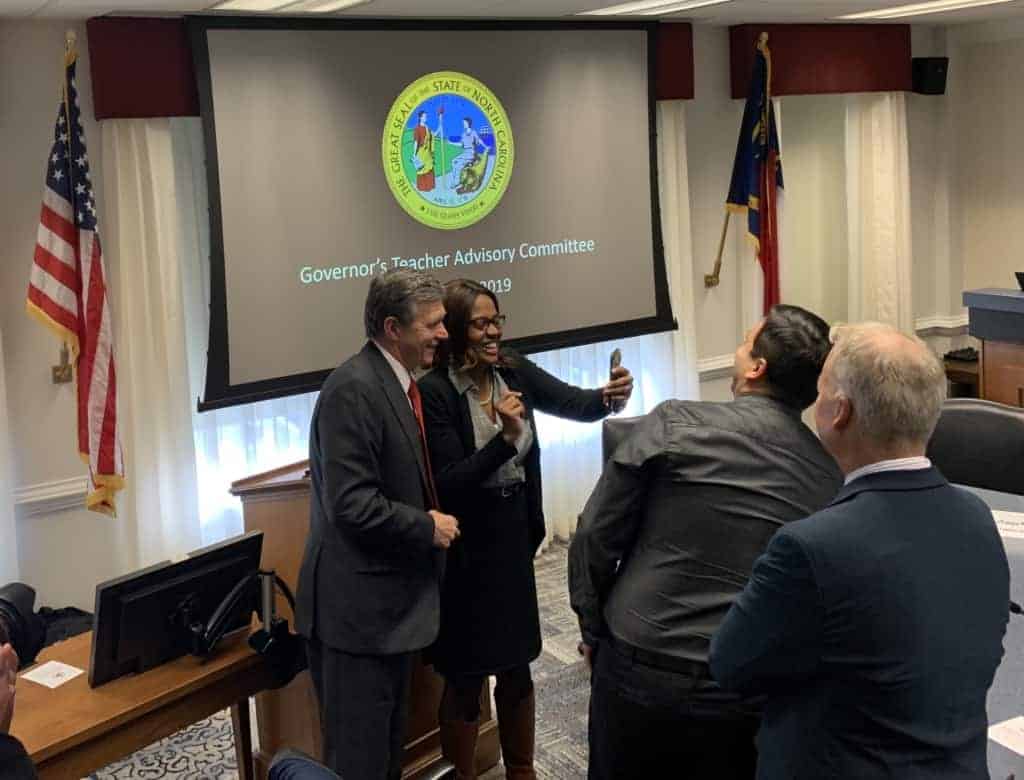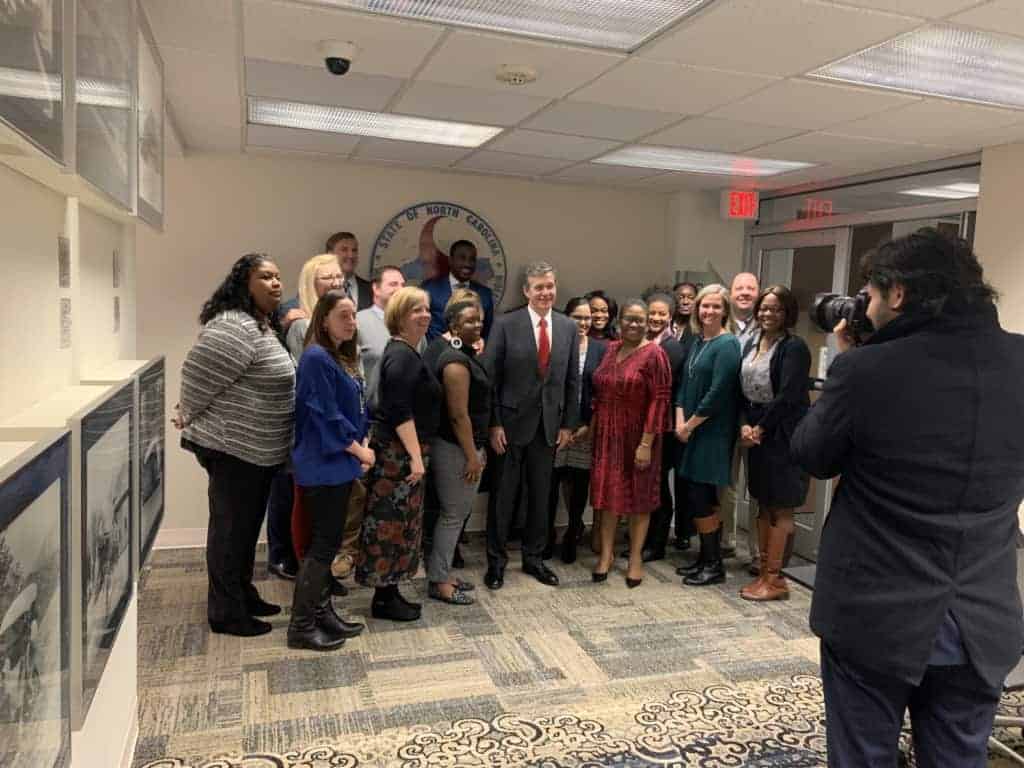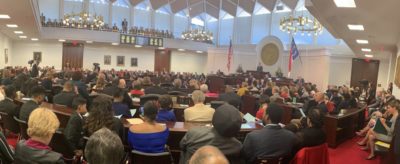

Governor Roy Cooper met with the Governor’s Teacher Advisory Committee yesterday to talk about some of his priorities ahead of the 2019-2020 legislative long session. In its second year after he established the committee with Executive Order No. 16 in August 2017, the committee continues to serve as his eyes and ears in the classrooms and advises him on education issues.
The committee meets quarterly, and independently in smaller breakout committees, as they finalize strategic plans to present to Gov. Cooper.
“One of the biggest benefits of an advisory counsel is communication,” Cooper said. “We are able to get first-hand knowledge from teachers who are in the field doing the work and they can also go back to tell them what’s happening in state government.”


On Monday, Cooper laid out three priorities to the committee, starting with the N.C. Teaching Fellows Program which was reinstated in 2018 after a seven year hiatus. The program provides up to $8,250 in tuition and fees per year for a four-year education in exchange for a commitment to teach special education or a STEM course in a state public school.
“We need to have a significant expansion of the teaching fellows program,” Cooper said. “It’s one of the best bang for the buck that I can imagine. … We’re getting the very best students who are agreeing to be teachers in our public schools for the next four years for the price of tuition and fees. To me, that is an amazing deal and we need to expand these teaching fellows scholarships.”
Cooper’s second agenda item was commitment to encouraging diversity in teaching.
“That means more men and it means more people of color in the profession,” Cooper said. “I strongly believe our state government, our law enforcement, our education system, ought to look like the people that it serves and protects. Each one of you at this table has been a role model for many kids and it is important for us to have a diversity of teachers to reflect the diversity of students we have at our public schools.”
Cooper’s final agenda item was communicating the strides the state and education system are making.
As he left, Cooper stopped to talk about the committee and its importance to his governorship.
“It’s been valuable since the day we met,” Cooper said. “… It’s important for me to hear from teachers first-hand, it’s important for me to be with them in their schools and I’ve made a concerted effort to do that. That helps us make better decisions. And it helps them in their efforts to teach their kids.”


Cooper recalled how, in its first year, the committee advised him immediately about issues related to the 2017 legislative mandate limiting classroom size.
“That caused significant problems with cutting out of arts programs and computer science programs — [the committee was] sort of a canary in the coal mine for us in that they were telling us that these things were coming down and that their principals were having a difficult time figuring out how they were going to respond to it. This ended up allowing us to present this case to the legislature and they did push it back.”
Now, he is turning to them for counsel on legislative priorities and budget planning.
“They’re working hard on policy initiatives that they see that they want me to undertake,” Cooper said. “We’ve been going back and forth on that right now. An overriding concern right now is attracting and retaining great teachers. And our teacher pipeline not only must be repaired, but it must be enhanced. That’s what we’re working on.”
For NaShonda Cooke, a special education interventionist at Carroll Middle School, the work has been rewarding.
“It’s an amazing opportunity,” she said, “to have such access and close connection with the governor, to be at the table with him and say, ‘Hey, this is what we’re seeing at the school.’ We are the ones who can answer his questions — how to retain the best teachers, how to get the best resources for our students, what’s needed, how to connect with our community members and stakeholders. This is like cutting the middle man out and going straight to the source.”
- Tomika Altman-Lewis is an academically and intellectually gifted (AIG) facilitator/teacher at Fayetteville Street Elementary School.
- Michael Bonner is an elementary school teacher at South Greenville Elementary School in Pitt County.
- Lara Brickhouse is an adaptive physical education teacher in Durham County Schools.
- Betty Brown teaches social studies at Zebulon GT Magnet School in Wake County.
- Deborah Brown teaches English at Research Triangle High School in Durham.
- Bobbie Cavnar is the 2016 North Carolina Teacher of the Year and teaches AP literature at South Point High School in Gaston County.
- Christine Conley teaches music at Needham B. Broughton High School in Wake County.
- Nashonda Cooke is a special education interventionist at Carroll Middle Magnet School in Wake County.
- LeAnna Delph teaches English language arts and social studies at Joe P. Eblen Intermediate School in Buncombe County.
- David Diamont is the head football coach at East Surry High School and teaches history as a substitute following 40+ years as a classroom teacher.
- Lisa Godwin is the 2017 North Carolina Teacher of the Year.
- Demetria Grissett is a career and technical education coordinator in Robeson County Schools.
- Mark Jewell is the president of the North Carolina Association of Educators.
- Tasha Martinez teaches English language arts at Warsaw Middle School in Duplin County.
- Denise McCoy is a parent involvement coordinator for Winston-Salem/Forsyth County Schools.
- Elyse McCrae teaches social studies at South Central High School in Pitt County.
- Freebird McKinney teacher social studies at Walter M. Williams High School in Burlington (*and serves on EdNC’s Board of Directors)
- Julio Morales teaches Spanish at Mattamuskeet Elementary School in Hyde County.
- Juandalynn Ray Sampson is the teacher advancement coordinator and language arts teacher in Clinton City Schools.
- Brad Rhew teaches science and math at Cook Literacy Model School in Forsyth County.
- Mireya Ruiz teaches 2nd grade and Spanish at Siler City Elementary School in Chatham County.
- Kimberly Sanderlin is an academically gifted/ELA specialist in Durham County Schools.
- Nicole Sikes teaches art at Anson High School in Anson County.
- Kimberley Strickland teaches 1st grade at River Dell Elementary in Johnston County.
- Mark Townley teaches academic, honors, and AP earth and environmental science at Holly Springs High School in Wake County.
- Keana Triplett is the 2015 North Carolina Teacher of the Year and teaches English at Ashe County High School.


